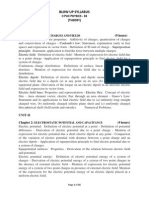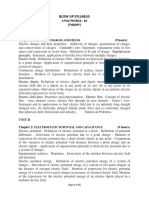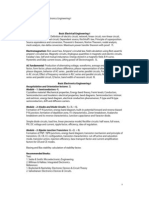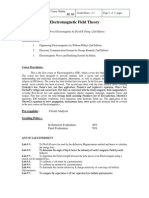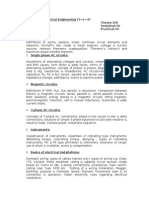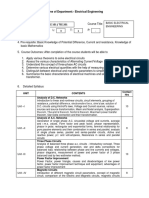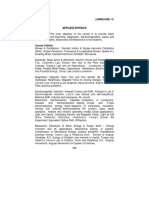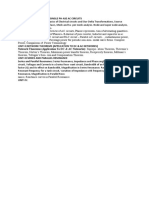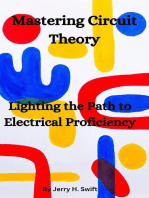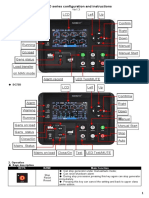Course Objective:: Module No. Description of Topic Lecture Hours
Uploaded by
K38Aryya BhattacharyaCSBSCourse Objective:: Module No. Description of Topic Lecture Hours
Uploaded by
K38Aryya BhattacharyaCSBSCourse Code: ESC201 Category: Engineering Science
Course Title: Basic Electrical Engineering Semester: Second
L-T-P: 2-0-0 Credit: 2
Pre-Requisites: High School Mathematics & Physics
Basic Electrical Engineering
Course Objective:
COE1: Toconceptualize the fundamental principles and theorems of ac and dc network and
signals.
COE2: Tobe able to understand the basics of networks and circuits and methods to solve them.
COE3: To be able to understand Electrostatics and Electromagnetism and their applications.
COE4: To be able to understand the concept single phase transformer, DC Machines and
working principle of induction motor.
Proposed Syllabus:
Module No. Description of Topic Lecture Hours
DC Circuits &Network Theorems: Definition of
electric circuit, network, linear circuit, non-linear
circuit, bilateral circuit, unilateral circuit, Dependent
source, Kirchhoff’s law, Principle of superposition.
1 7
Source equivalence and conversion, Thevenin’s
theorem, Norton Theorem, nodal analysis, mesh
analysis, star-delta conversion. Maximum power
transfer theorem with proof.
Electrostatics: Coulomb’s law, Electric Field
Intensity, Electric field due to a group of charges,
continuous charge distribution, Electric flux, Flux
density, Electric potential, potential difference,
Gauss’s law, proof of gauss’s law, its applications to
2 8
electric field and potential calculation, Capacitor,
capacitance of parallel plate capacitor, spherical
capacitor, isolated spheres, concentric conductors,
parallel conductors. Energy stored in a capacitor.
Electromagnetism: Biot-savart law, Ampere’s
circuital law, field calculation using Biot-savart
&ere’s circuital law. Magnetic circuits,
Analogous quantities in magnetic and electric
circuits, Faraday’s law, Self and mutual inductance.
Energy stored in a magnetic field, B-H curve,
Hysteretic and Eddy current losses.
AC Circuit Analysis: RMS Values, average value,
phasor representation of alternating quantities.
Concept of j-operator, Steady state AC circuit
analysis for R, L, C, RL, RC & RLC series and
3 5
parallel circuits. Series and parallel resonance
condition. AC power calculations. Introduction to
three phase systems, balanced. Star and delta
connections. Measurement of three phase power.
DC Machines: Construction, Basic concepts of
winding (Lap and wave). DC generator: Principle of
operation, EMF equation, characteristics (open
4 circuit, load) DC motors: Principle of operation, 5
Speed-torque Characteristics (shunt and series
machine), starting (by 3 point starter), speed control
(armature voltage and field control)
Single phase transformer: Core and shell type
construction, EMF equation, no load and on load
operation, phasor diagram and equivalent circuit,
losses of a transformer, open and short circuit tests,
regulation and efficiency calculation.
3 phase induction motor: Types, Construction,
5 production of rotating field, principle of operation, 6
equivalent circuit and phasor diagram, rating, torque-
speed characteristics (qualitative only). Starter for
squirrel cage and wound rotor induction motor. Brief
introduction of speed control of 3 phase induction
motor (voltage control, frequency control, resistance
control)
Course Outcome:
CO1: Student will be able to understand the fundamentals of DC and AC analysis of circuit.
CO2: Student will be able to use KCL and KVL as fundamental tool for network
solutions
CO3: Student will be able to understand the concept of resonance in RLC circuits,
concept of DC machines.
CO4: Student will be to develop the understanding of single phase transformer, induction motor.
Learning Resources
1.Basic Electrical Engineering -Abhijit Chakrabarti, Sudipta Nath,Chandan Kumar Chanda
2.Basic Electrical Engineering (vol2)-B.L.Thereja
3.Basic Electrical engineering, D.P Kothari & I.J Nagrath, TMH, Second Edition
4.Hughes Electrical & Electronics Technology, 8/e, Hughes, Pearson Education
You might also like
- Beeg1001: Basic Electrical Engineering: Credits: 04 L-T-P-J:3-1-0-0No ratings yetBeeg1001: Basic Electrical Engineering: Credits: 04 L-T-P-J:3-1-0-01 page
- Principles of Electrical Engineering (ECE) : Unit 1 DC CircuitsNo ratings yetPrinciples of Electrical Engineering (ECE) : Unit 1 DC Circuits2 pages
- ELCT 221 Syllabus: Chapter 1: Basic ConceptsNo ratings yetELCT 221 Syllabus: Chapter 1: Basic Concepts3 pages
- Ece102 Fundamentals-Of-electrical-Engineering TH 1.10 Ac29No ratings yetEce102 Fundamentals-Of-electrical-Engineering TH 1.10 Ac291 page
- Course Information: Course Code: ES 101 Course Name: Basic Electrical and Electronics Engg.-I (Electrical) Contacts: 2No ratings yetCourse Information: Course Code: ES 101 Course Name: Basic Electrical and Electronics Engg.-I (Electrical) Contacts: 23 pages
- Courses Offered by EEE Department: Course Curriculum of The Department of Electrical and Electronic EngineeringNo ratings yetCourses Offered by EEE Department: Course Curriculum of The Department of Electrical and Electronic Engineering30 pages
- ES101 - Baisc Electrical & Electronics EngineeringNo ratings yetES101 - Baisc Electrical & Electronics Engineering2 pages
- Electromagnetic Feild Theory - EE315 - 14-07-2008No ratings yetElectromagnetic Feild Theory - EE315 - 14-07-20082 pages
- Amie03 Fundamentals of Electrical Engineering: Unit-1 Elementary ConceptsNo ratings yetAmie03 Fundamentals of Electrical Engineering: Unit-1 Elementary Concepts2 pages
- Ece1001 Fundamentals-Of-Electrical-Circuits Eth 1.0 37 Ece1001No ratings yetEce1001 Fundamentals-Of-Electrical-Circuits Eth 1.0 37 Ece10012 pages
- CBSE Class 12 Physics Unit - 1 Syllabus: Electrostatics: Chapter - 1: Electric Charges and FieldsNo ratings yetCBSE Class 12 Physics Unit - 1 Syllabus: Electrostatics: Chapter - 1: Electric Charges and Fields2 pages
- Basic Electrical Engineering (14ele15-14ele25)No ratings yetBasic Electrical Engineering (14ele15-14ele25)3 pages
- Basic Electrical and Electronics SyllabusNo ratings yetBasic Electrical and Electronics Syllabus2 pages
- National Institute of Technology Mizoram: Department of Electrical and Electronics Engineering Btech SyllabusNo ratings yetNational Institute of Technology Mizoram: Department of Electrical and Electronics Engineering Btech Syllabus32 pages
- Applied Electricity or Basic ElectricityNo ratings yetApplied Electricity or Basic Electricity8 pages
- Name of Department:-Electrical EngineeringNo ratings yetName of Department:-Electrical Engineering2 pages
- Common To E&C and EI&C: Department of Technical Education100% (1)Common To E&C and EI&C: Department of Technical Education10 pages
- Physics: Syllabus For Higher Secondary Final Year CourseNo ratings yetPhysics: Syllabus For Higher Secondary Final Year Course5 pages
- IC_T3_BasisElectricalElectronics.pptx (1).pdfNo ratings yetIC_T3_BasisElectricalElectronics.pptx (1).pdf54 pages
- Applied Electricity or Basic Electricity by Ifiokobong AkpanNo ratings yetApplied Electricity or Basic Electricity by Ifiokobong Akpan8 pages
- EE332 - Electric Circuit Analysis Course PlanNo ratings yetEE332 - Electric Circuit Analysis Course Plan3 pages
- CSBS, K, 38 Aryya Bhattacharya - 2021-04-10No ratings yetCSBS, K, 38 Aryya Bhattacharya - 2021-04-101 page
- Institute of Engineering & Management Mid Semester Examination - Odd Semester 2020No ratings yetInstitute of Engineering & Management Mid Semester Examination - Odd Semester 20203 pages
- Institute of Engineering & Management Mid Semester Examination - Odd Semester 2020No ratings yetInstitute of Engineering & Management Mid Semester Examination - Odd Semester 20203 pages
- Free Energy: Nikola Tesla Secrets For EverybodyNo ratings yetFree Energy: Nikola Tesla Secrets For Everybody45 pages
- 874 Series Fuse,: Axial Lead & Cartridge FusesNo ratings yet874 Series Fuse,: Axial Lead & Cartridge Fuses3 pages
- Types of Lightning Arresters - Circuit GlobeNo ratings yetTypes of Lightning Arresters - Circuit Globe9 pages
- Operating Instructions: Solar Charge ControllerNo ratings yetOperating Instructions: Solar Charge Controller20 pages
- Schematic, Amplifier Channel, Ex 2500 Schematic, Amplifier Channel, Ex 2500No ratings yetSchematic, Amplifier Channel, Ex 2500 Schematic, Amplifier Channel, Ex 25005 pages
- DC7xD Series Configuration and Instructions V1.3-180630No ratings yetDC7xD Series Configuration and Instructions V1.3-18063017 pages
- Cold Buster - INSTALLATION-Slab-Manual-JUL-2023No ratings yetCold Buster - INSTALLATION-Slab-Manual-JUL-202312 pages




